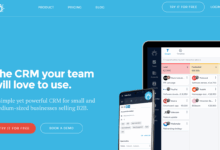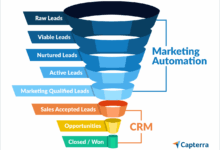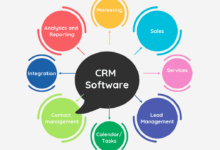Top Cloud-Based CRM Platforms: A Comprehensive Guide
Top Cloud-Based CRM Platforms are revolutionizing how businesses manage customer relationships. This guide delves into the leading platforms, comparing their features, pricing, and suitability for diverse business needs. We’ll explore the advantages of cloud-based solutions over traditional on-premise systems, examining key aspects like sales and marketing automation, customer service capabilities, scalability, security, and implementation considerations. Understanding these factors is crucial for selecting the CRM that best aligns with your organization’s goals and growth strategy.
From streamlining sales processes and automating marketing campaigns to enhancing customer service and providing insightful analytics, cloud-based CRMs offer a powerful suite of tools. This exploration will empower you to make an informed decision when choosing the right platform to elevate your business operations and cultivate stronger customer relationships.
Introduction to Cloud-Based CRM Platforms
Cloud-based Customer Relationship Management (CRM) platforms represent a significant shift in how businesses manage interactions with customers. Instead of relying on software installed and maintained on company servers (on-premise), cloud-based CRMs utilize remote servers and the internet to provide access to CRM functionalities. This approach offers several key advantages over traditional methods.
Cloud-based CRM systems offer numerous benefits compared to on-premise solutions. The most significant advantage is reduced upfront costs. Businesses avoid the expense of purchasing and maintaining expensive server hardware, software licenses, and IT personnel dedicated to system upkeep. Furthermore, cloud-based CRMs often operate on a subscription model, allowing for predictable and scalable monthly expenses. Scalability itself is another major benefit; resources can be easily adjusted to meet fluctuating business needs, adding or reducing capacity as required. Accessibility is also enhanced, with authorized users able to access the CRM system from anywhere with an internet connection, promoting collaboration and responsiveness. Finally, regular updates and maintenance are handled by the CRM provider, freeing up internal IT resources to focus on other strategic initiatives.
Types of Cloud-Based CRM Deployments
Cloud-based CRM deployments come in several variations, each offering a different balance of control, cost, and security. Understanding these differences is crucial for choosing the right solution for a specific business.
| Deployment Model | Description | Advantages | Disadvantages |
|---|---|---|---|
| Public Cloud | The CRM software and infrastructure are hosted by a third-party provider and shared among multiple users. Examples include Salesforce and Microsoft Dynamics 365. | Cost-effective, scalable, easy to implement. | Less control over data security and customization. Potential for vendor lock-in. |
| Private Cloud | The CRM software and infrastructure are dedicated to a single organization, often hosted on a private server managed either in-house or by a third-party provider. | Greater control over data security and customization. Enhanced compliance with specific regulations. | Higher upfront and ongoing costs. Requires more IT expertise for management. |
| Hybrid Cloud | A combination of public and private cloud deployments, allowing organizations to leverage the benefits of both. For example, sensitive data might be stored on a private cloud, while less sensitive data resides on a public cloud. | Flexibility to balance cost, security, and control. Allows for scalability and customization where needed. | More complex to manage and requires careful planning and integration. |
Top Platforms Overview
Choosing the right cloud-based CRM can significantly impact a business’s efficiency and growth. This section provides an overview of five leading platforms, detailing their core functionalities, pricing models, and user interfaces. Understanding these aspects is crucial for making an informed decision.
Leading Cloud-Based CRM Platforms
Five prominent cloud-based CRM platforms are Salesforce Sales Cloud, Microsoft Dynamics 365, HubSpot CRM, Zoho CRM, and SAP CRM. Each offers a unique blend of features and caters to different business needs and sizes.
Core Functionalities of Leading CRM Platforms
The core functionalities of these platforms generally include contact management, lead management, sales pipeline management, opportunity tracking, reporting and analytics, and customer service features. However, the depth and breadth of these functionalities vary across platforms. For example, Salesforce Sales Cloud is known for its robust sales force automation tools and extensive customization options, while HubSpot CRM emphasizes inbound marketing integration and a user-friendly interface. Microsoft Dynamics 365 offers strong integration with other Microsoft products, while Zoho CRM boasts a wide array of integrated apps and a competitive price point. SAP CRM is often favored by large enterprises for its enterprise-level capabilities and integration with other SAP systems.
Pricing Models for Leading CRM Platforms
Pricing models vary considerably. Salesforce Sales Cloud utilizes a tiered subscription model, with pricing dependent on the number of users and the features included. Microsoft Dynamics 365 also uses a subscription model, offering different plans based on functionality and user count. HubSpot CRM offers a freemium model, with a free version for basic functionality and paid plans for advanced features. Zoho CRM offers a similar tiered subscription model with various pricing plans to suit different business sizes and needs. SAP CRM typically employs a more complex pricing structure, often involving licensing fees and implementation costs tailored to individual enterprise requirements.
User Interfaces and User Experiences
Each platform presents a distinct user interface and user experience. Salesforce Sales Cloud, while powerful, can have a steeper learning curve due to its extensive features. Microsoft Dynamics 365 offers a more intuitive interface, particularly for users familiar with other Microsoft products. HubSpot CRM is generally praised for its user-friendly design and ease of navigation, making it accessible to users with varying levels of technical expertise. Zoho CRM also offers a relatively intuitive interface, while SAP CRM’s interface can be complex due to its comprehensive features, often requiring specialized training. The optimal user experience is subjective and depends on individual preferences and technical proficiency.
Feature Comparison
Choosing the right cloud-based CRM often hinges on the effectiveness of its sales and marketing automation capabilities. This section compares five leading platforms across these crucial features, highlighting their strengths and weaknesses to aid in informed decision-making. We will examine sales automation tools, marketing automation features, integration capabilities, and workflow support.
Sales Automation Capabilities
Sales automation streamlines repetitive tasks, freeing up sales teams to focus on building relationships and closing deals. The five platforms offer varying levels of sophistication in this area. For example, Salesforce’s Sales Cloud boasts robust features like lead scoring, opportunity management, and sales forecasting, providing a comprehensive solution for managing the entire sales lifecycle. HubSpot CRM, while simpler to use, offers effective contact management and deal tracking. Microsoft Dynamics 365 provides a strong sales automation suite integrating well with other Microsoft products. Zoho CRM offers a wide range of features at a competitive price point, including sales process automation and territory management. Finally, Pipedrive focuses on a more streamlined approach, emphasizing simplicity and ease of use for smaller sales teams, prioritizing sales pipeline visualization.
Marketing Automation Features
Effective marketing automation nurtures leads, personalizes communications, and optimizes campaigns. Each platform offers a distinct set of marketing automation tools. Salesforce Marketing Cloud provides advanced capabilities such as email marketing, social media management, and marketing analytics. HubSpot’s marketing tools are tightly integrated with its CRM, allowing for seamless lead nurturing and campaign tracking. Microsoft Dynamics 365 Marketing offers similar features with strong integration with other Microsoft products. Zoho CRM’s marketing automation features are comprehensive, including email marketing, landing pages, and social media management. Pipedrive, while less focused on marketing automation compared to others, still offers basic email marketing and integration options with third-party tools.
Integration Capabilities with Other Marketing Tools
Seamless integration with other marketing tools is crucial for a cohesive marketing strategy. The table below illustrates the integration capabilities of the five platforms. Note that the level of integration can vary depending on the specific tool and the platform’s API.
| Platform | Email Marketing | Marketing Automation Platforms | Social Media Management |
|---|---|---|---|
| Salesforce | Salesforce Marketing Cloud, ExactTarget | Marketo, Pardot | Various integrations via AppExchange |
| HubSpot | Built-in | Tight integration with HubSpot Marketing Hub | Built-in, plus various integrations |
| Microsoft Dynamics 365 | Built-in, plus integrations with other email providers | Various integrations, including Adobe Marketing Cloud | Various integrations |
| Zoho CRM | Zoho Campaigns | Zoho Marketing Hub | Various integrations |
| Pipedrive | Limited built-in features, integrations with Mailchimp, etc. | Limited direct integrations, relies on third-party tools | Limited integrations |
Sales and Marketing Workflow Examples
Each platform supports various sales and marketing workflows. For instance, in Salesforce, a lead generated through a marketing campaign might be automatically scored based on pre-defined criteria. High-scoring leads are then routed to the appropriate sales representative for follow-up, triggering automated email sequences and tasks. In HubSpot, a similar workflow might involve lead nurturing through automated email sequences, triggered by website activity or form submissions. Microsoft Dynamics 365 can support workflows involving lead scoring, segmentation, and personalized email marketing. Zoho CRM allows for the creation of customized sales pipelines and automated tasks, while Pipedrive emphasizes visual pipeline management and automated reminders for sales representatives. These examples illustrate how each platform facilitates streamlined workflows.
Customer Service & Support Capabilities
Effective customer service and robust support capabilities are critical differentiators for cloud-based CRM platforms. The ability to efficiently manage customer interactions, track support performance, and leverage data for improved service directly impacts customer satisfaction and loyalty. This section examines the customer service features of several leading platforms, comparing their dashboards, relationship management tools, and key performance indicators.
Customer Service Feature Comparison
Each platform offers a unique set of customer service features designed to streamline support processes and improve customer experience. Salesforce Service Cloud, for instance, provides features such as case management, knowledge bases, and community forums, enabling agents to quickly resolve issues and empower customers to find solutions independently. Zendesk, known for its comprehensive ticketing system, allows for robust customization and integration with other tools, enhancing agent efficiency. Similarly, Microsoft Dynamics 365 Customer Service offers a holistic approach, integrating seamlessly with other Microsoft products and providing advanced AI-powered features like chatbots and sentiment analysis. Freshdesk focuses on ease of use and scalability, making it a popular choice for businesses of all sizes. These platforms often provide features like omnichannel support, allowing for communication across various channels (email, phone, chat, social media).
Reporting and Analytics Dashboards for Customer Service Performance
Comprehensive reporting and analytics dashboards are crucial for monitoring and improving customer service performance. Salesforce Service Cloud offers customizable dashboards that visualize key metrics such as average resolution time, customer satisfaction scores (CSAT), and agent performance. Zendesk provides similar capabilities, allowing users to track ticket volume, agent productivity, and first-contact resolution rates. Microsoft Dynamics 365 Customer Service leverages Power BI for advanced analytics and reporting, providing a deeper understanding of customer service trends and patterns. Freshdesk offers intuitive dashboards displaying key metrics, enabling managers to identify areas for improvement and track progress towards service goals. These dashboards often provide visualizations such as charts and graphs, allowing for quick identification of trends and potential problems. For example, a spike in average resolution time might indicate a need for additional training or resources.
Customer Relationship Management Facilitation
These platforms facilitate CRM by centralizing customer interactions and data. Salesforce Service Cloud, for example, integrates seamlessly with Salesforce Sales Cloud, providing a 360-degree view of the customer. This unified view allows support agents to access complete customer history, purchase details, and past interactions, enabling them to provide personalized and efficient service. Zendesk’s integration capabilities allow similar functionalities, connecting customer service data with other business systems. Microsoft Dynamics 365 Customer Service similarly integrates with other Dynamics 365 modules, offering a unified view of the customer journey. Freshdesk’s focus on ease of use and integration simplifies the process of connecting customer service with other business functions. This holistic approach improves the customer experience by providing consistent and personalized interactions across all touchpoints.
Key Metrics Tracked for Customer Support
Understanding key performance indicators (KPIs) is vital for optimizing customer support. The platforms typically track metrics such as:
- Average Resolution Time (ART): The average time it takes to resolve a customer issue.
- First Contact Resolution (FCR): The percentage of issues resolved on the first contact.
- Customer Satisfaction (CSAT): A measure of customer happiness with the support received.
- Net Promoter Score (NPS): A measure of customer loyalty and willingness to recommend the service.
- Ticket Volume: The total number of support tickets received.
- Average Handle Time (AHT): The average time spent on each customer interaction.
- Agent Productivity: A measure of the number of tickets resolved per agent.
The specific metrics tracked and the methods of calculation might vary slightly across platforms, but these are common benchmarks used to assess and improve customer support performance. Regular monitoring of these metrics enables businesses to identify areas for improvement and make data-driven decisions to enhance the overall customer experience.
Scalability and Integration
Choosing a cloud-based CRM requires careful consideration of scalability and integration capabilities. A platform’s ability to adapt to your business growth and seamlessly connect with existing systems is crucial for long-term success. This section examines the scalability and integration features of leading cloud-based CRM platforms.
The scalability of a CRM platform refers to its capacity to handle increasing amounts of data, users, and transactions without compromising performance. Integration, on the other hand, describes the platform’s ability to connect with other software applications, enabling data flow and automation between different business systems. Customizability allows businesses to tailor the platform to their specific needs, extending its functionality beyond the standard features.
Scalability Options
Each platform offers different scalability options. Some provide straightforward scaling through tiered pricing plans, allowing businesses to upgrade their subscription as their needs grow. Others offer more granular control, allowing adjustments to storage, processing power, and user licenses independently. For example, Salesforce offers various editions, from Essentials to Unlimited, catering to different business sizes and requirements. Similarly, Microsoft Dynamics 365 provides flexible licensing models that allow businesses to scale their deployment incrementally. Zoho CRM offers a range of plans, allowing businesses to select the features and user count that best suits their current and anticipated needs. The choice depends on the anticipated growth rate and the level of control desired.
Integration with Other Business Applications
Seamless integration with other business applications is paramount. Most leading CRM platforms offer robust integration capabilities through APIs (Application Programming Interfaces), connectors, and pre-built integrations with popular applications. For instance, Salesforce boasts a vast AppExchange marketplace with numerous pre-built integrations for ERP systems like SAP and Oracle NetSuite, accounting software such as Xero and QuickBooks, and marketing automation platforms like Marketo and Pardot. Microsoft Dynamics 365 integrates tightly with the Microsoft ecosystem, including Office 365, Power BI, and Azure. Zoho CRM offers a comprehensive suite of integrated applications, and also provides APIs for custom integrations. The specific integrations available vary across platforms, and businesses should carefully assess their existing technology stack to ensure compatibility.
Customization and Extension of Functionality
Customization and extension are crucial for tailoring the CRM to specific business processes. Many platforms allow customization through configuration options, enabling adjustments to workflows, fields, and user interfaces without requiring coding. Advanced customization often involves using APIs or custom development to integrate new functionalities or build custom applications. Salesforce’s Apex programming language and Lightning Web Components enable sophisticated customization, while Microsoft Dynamics 365 allows customization through its Power Platform. Zoho CRM offers a range of customization options through its developer tools and API. The level of customization available varies across platforms, with some offering more extensive options than others.
Integration APIs Offered
Understanding the available APIs is essential for integrating the CRM with other systems. The type and richness of the APIs offered directly impact the ease and flexibility of integration.
- Salesforce: REST APIs, SOAP APIs, Bulk APIs, Streaming APIs, and various platform-specific APIs.
- Microsoft Dynamics 365: OData APIs, Web APIs, and various platform-specific APIs, leveraging the Power Platform.
- Zoho CRM: REST APIs, offering a comprehensive set of functionalities for data manipulation and automation.
Security and Compliance
Protecting your valuable customer data is paramount when choosing a cloud-based CRM. The security measures and compliance certifications of each platform are critical factors in making an informed decision. This section details the security features, compliance standards met, and data backup and recovery options offered by leading cloud-based CRM platforms. Remember to always verify the most up-to-date information directly with the platform providers.
Security Measures Implemented by Top CRM Platforms
Each platform employs a multi-layered approach to data security. This typically includes robust encryption protocols (both in transit and at rest), access controls based on roles and permissions, regular security audits, and intrusion detection systems. For example, Salesforce utilizes a combination of encryption, data masking, and access controls to protect customer data, while HubSpot employs similar measures, supplemented by its security operations center (SOC) for proactive threat monitoring. Salesforce’s Trust Center provides detailed information on their security practices, including penetration testing and vulnerability management programs. HubSpot also offers extensive documentation outlining its security posture. These security measures aim to prevent unauthorized access, modification, or disclosure of sensitive information.
Compliance Certifications
Compliance certifications demonstrate a platform’s commitment to adhering to industry-standard security and data privacy regulations. Many leading platforms hold certifications such as ISO 27001 (information security management), SOC 2 (service organization controls), GDPR (General Data Protection Regulation), and HIPAA (Health Insurance Portability and Accountability Act). The specific certifications held vary by platform. For instance, Salesforce boasts a wide array of compliance certifications, reflecting its global reach and diverse clientele. Similarly, HubSpot highlights its compliance with GDPR and other relevant regulations, demonstrating its commitment to data privacy. Checking for relevant certifications is crucial, especially if your business operates in regulated industries or handles sensitive personal data.
Data Backup and Recovery Options
Data backup and recovery are essential components of a robust security strategy. Cloud-based CRM platforms typically offer automated backup and recovery options, ensuring business continuity in the event of data loss or system failure. The frequency of backups and the recovery time objective (RTO) and recovery point objective (RPO) vary between platforms. Salesforce, for example, provides multiple layers of redundancy and automated backups, minimizing downtime in case of unforeseen events. HubSpot similarly offers automated backups and disaster recovery plans to safeguard customer data. Understanding the backup and recovery capabilities is crucial for evaluating the resilience and reliability of a platform.
Summary of Security Features
In summary, the security features offered by leading cloud-based CRM platforms are comprehensive and continuously evolving. These features typically include data encryption, access controls, regular security audits, intrusion detection systems, compliance certifications, and robust backup and recovery mechanisms. The specific features and their implementation may differ between platforms, so careful evaluation is needed to ensure the chosen platform aligns with your organization’s specific security requirements and risk tolerance. It’s advisable to thoroughly review each platform’s security documentation and engage in discussions with their security teams to gain a complete understanding of their capabilities.
Deployment and Implementation
Successfully deploying and implementing a cloud-based CRM requires careful consideration of various factors, including the chosen platform’s deployment options, the anticipated implementation timeline, and the level of support and training provided by the vendor. This section details these crucial aspects for leading cloud-based CRM platforms.
Deployment Options
Most leading cloud-based CRM platforms primarily offer cloud deployment. This means the software resides on the vendor’s servers, accessible via the internet. This eliminates the need for on-premise server infrastructure and associated maintenance. While some platforms might offer hybrid options (combining cloud and on-premise components) or limited on-premise deployments for highly specific enterprise needs, the dominant model remains cloud-based. This significantly simplifies deployment and reduces upfront capital expenditure.
Implementation Timelines
Implementation timelines vary considerably depending on factors like the size and complexity of the organization, the chosen platform, the level of customization required, and the internal resources dedicated to the project. Smaller businesses with straightforward requirements might complete implementation within a few weeks, while larger enterprises with extensive data migration and complex integrations could require several months. Vendors typically provide project timelines based on an assessment of the client’s needs. For example, a simple Salesforce implementation for a small business might take 4-6 weeks, while a large-scale implementation for a multinational corporation might stretch over 6 months or longer.
Support and Training During Implementation
Robust support and training are critical for a smooth implementation. Most vendors offer various levels of support, ranging from self-service documentation and online tutorials to dedicated implementation consultants and personalized training sessions. These services usually cover data migration, system configuration, user training, and ongoing technical assistance. The level of support provided often correlates with the pricing tier and the complexity of the implementation. For instance, Salesforce offers a comprehensive suite of training resources and implementation services, including expert consultants to guide organizations through the process. Similarly, Microsoft Dynamics 365 provides extensive documentation, online training, and partner-led implementation services tailored to customer needs.
Implementation Complexity Comparison
The table below offers a comparative overview of the implementation complexities across several leading cloud-based CRM platforms. Note that these are general observations and actual complexities can vary based on specific organizational needs and chosen features.
| Platform | Deployment Complexity | Implementation Timeline (Estimated) | Support & Training |
|---|---|---|---|
| Salesforce | Medium to High (depending on customization) | 4-12 weeks (small business) to 6+ months (enterprise) | Extensive documentation, online training, consultants, and support channels. |
| Microsoft Dynamics 365 | Medium | 6-12 weeks (small business) to 6+ months (enterprise) | Comprehensive documentation, online training, partner-led implementation services. |
| HubSpot | Low to Medium | 2-8 weeks (depending on features and integration needs) | Extensive online documentation, tutorials, and community support. |
| Zoho CRM | Low | 1-4 weeks (depending on user needs and data migration) | Online documentation, tutorials, and email/phone support. |
Ultimate Conclusion
Selecting the optimal cloud-based CRM requires careful consideration of various factors. This guide has provided a detailed comparison of leading platforms, highlighting their strengths and weaknesses across key functionalities. By understanding the nuances of each platform’s features, pricing, and integration capabilities, businesses can confidently choose a solution that aligns perfectly with their specific requirements and contributes to their overall success. Remember to prioritize security, scalability, and ease of use when making your final decision.




